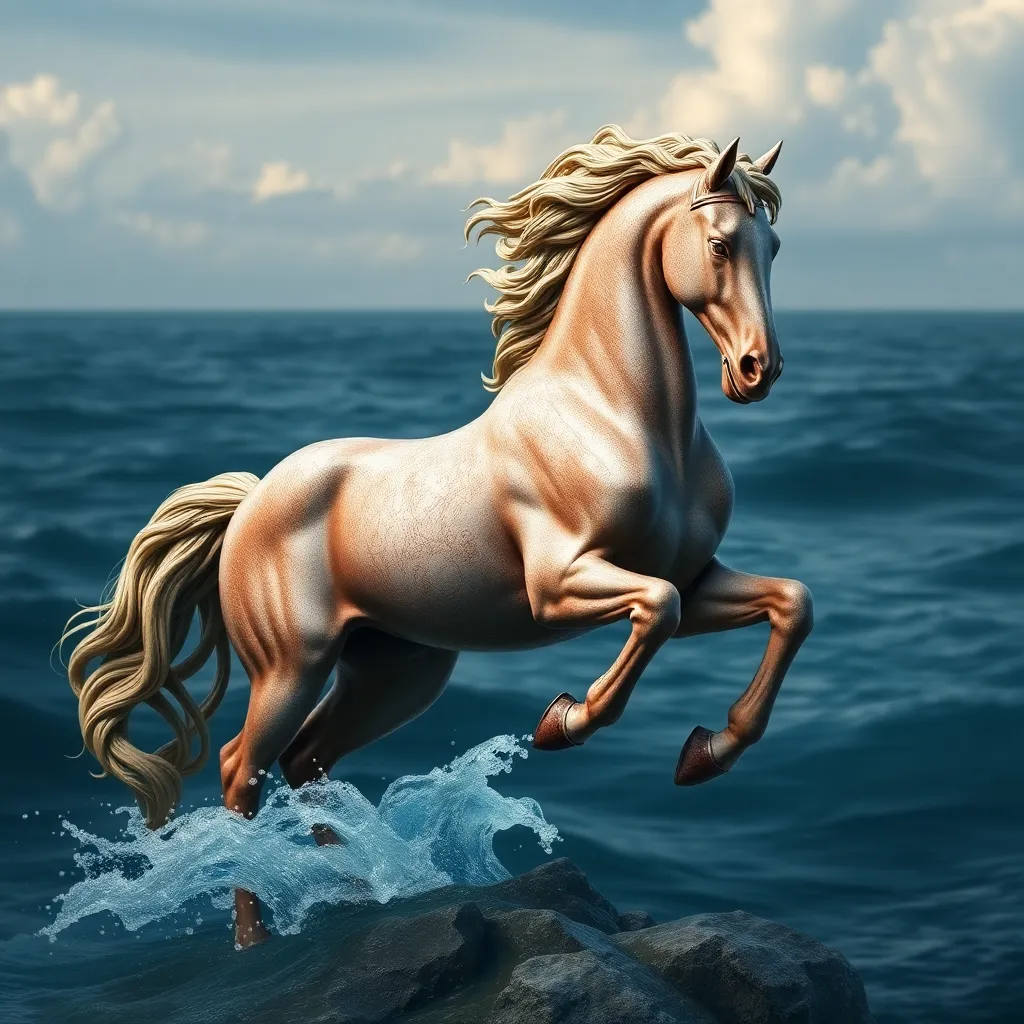Poseidon’s Role in the Creation of the Horse: Mythological Insights
I. Introduction
In the vast landscape of Greek mythology, Poseidon stands out as one of the most powerful and multifaceted deities. Known primarily as the god of the sea, he also holds dominion over earthquakes and horses, making him a significant figure among the Olympian gods. Horses played a vital role in ancient Greek culture, symbolizing strength, nobility, and the warrior spirit. This article aims to explore the intricate connection between Poseidon and the creation of horses, delving into the myths that surround this fascinating relationship.
II. Poseidon: The God of the Sea and Earthquakes
Poseidon is often depicted as a robust figure wielding a trident, a symbol of his power over the ocean and the earth. His domains include:
- The oceans and seas
- Earthquakes and storms
- Horses and equestrian pursuits
As one of the Twelve Olympians, Poseidon holds a place of great significance among the gods. His duality as both a creator and destroyer is evident in the way he governs the natural world; he can bring forth life and prosperity through the bounty of the sea, yet unleash chaos and destruction during tempests or earthquakes. This complex nature makes Poseidon a compelling figure in mythology.
III. The Myth of the Horse’s Creation
The creation of the horse is a tale steeped in myth and symbolism. According to ancient narratives, Poseidon played a pivotal role in this process. One of the most notable myths involves the competition between Poseidon and Athena for the patronage of the city of Athens. To win favor, Poseidon struck the ground with his trident, producing a magnificent horse. This act not only showcased his prowess but also symbolized the harmonious relationship between man and nature.
Key figures in this narrative include:
- Athena: The goddess of wisdom who ultimately won the contest, yet respected the value of Poseidon’s creation.
- Chiron: The wise centaur who served as a mentor to many Greek heroes, further emphasizing the noble qualities of horses.
In this myth, Poseidon emerges not just as a creator of horses, but as a symbol of the deep connection between divine beings and the natural world.
IV. Symbolism of the Horse in Greek Mythology
The horse holds profound symbolism in Greek mythology, often representing strength, power, and nobility. This symbolism extends to various deities, notably:
- Apollo: The god of the sun, who is often depicted riding a chariot drawn by horses.
- Demeter: The goddess of agriculture, who is associated with the fertility of the land and the animals that inhabit it.
Additionally, horses were crucial in ancient Greek society, particularly in warfare. They symbolized mobility and strength on the battlefield, often determining the outcome of conflicts. The connection between horses and human valor is a recurring theme in Greek literature and art.
V. Poseidon and the Horse: A Complex Relationship
Examining Poseidon’s motivations for creating the horse reveals a complex interplay of divine favor and potential wrath. The horse can be seen as:
- A symbol of divine blessing, representing strength and nobility.
- A creature that embodies Poseidon’s temperamental nature, reflecting both his creative and destructive capacities.
Furthermore, Poseidon’s relationships with other horse-associated figures, such as the centaurs and the heroes of Greek myth, illustrate the multifaceted aspects of his character. These relationships often highlight the duality of horses as both companions and forces of chaos, embodying the unpredictable nature of Poseidon himself.
VI. Literary References to Poseidon and Horses
Ancient texts provide rich insights into the relationship between Poseidon and horses. Notable authors such as:
- Homer: In works like the “Iliad,” horses are depicted as symbols of glory and heroism, often associated with the divine.
- Hesiod: In “Theogony,” he explores the origins of various gods, including Poseidon, and their connections to horses.
The portrayal of Poseidon in these texts emphasizes his role as a powerful deity whose creations have lasting significance in human culture. The influence of these myths extends beyond ancient literature, inspiring art and storytelling throughout history.
VII. The Legacy of Poseidon in Equestrian Culture
The legacy of Poseidon can be seen in various aspects of equestrian culture. In ancient Greece, horses were integral to rituals and festivals, often associated with:
- Religious ceremonies honoring Poseidon.
- Athletic competitions such as the Panhellenic Games, where horse racing was a featured event.
Today, Poseidon’s influence persists in modern equestrian practices. Horses continue to symbolize power and grace, and many riders and equestrians maintain a reverence for the divine origins attributed to these animals. Contemporary horse culture often reflects the ancient Greeks’ understanding of the bond between humans and horses.
VIII. Conclusion
Poseidon’s influential role in the creation of the horse is a testament to the enduring power of mythology in shaping human understanding of nature. Through his actions, Poseidon embodies the duality of creation and destruction, reflecting the complexities of the natural world. The myths surrounding Poseidon and horses not only enrich our understanding of ancient Greek culture but also resonate in today’s society, reminding us of the profound connections between divinity, nature, and humanity.
Ultimately, these stories illuminate the intersection of mythology and human experience, showcasing how ancient beliefs continue to inform our relationship with the natural world and its majestic creatures.
https://www.youtube.com/watch?v=V81_p4QoTU0




